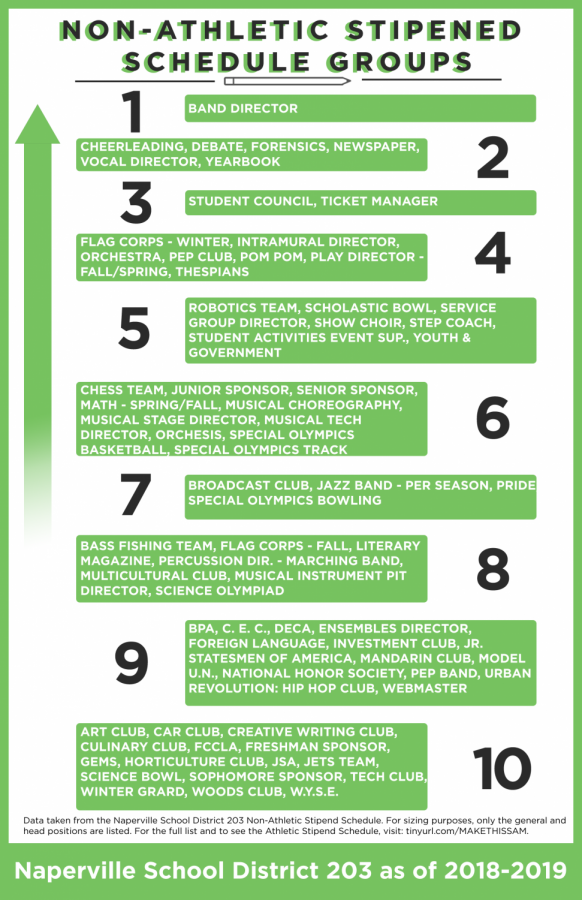DECA adviser resigns, citing low stipend pay
April 18, 2019
Longtime DECA adviser and business teacher Christine Bell has resigned her position as sponsor of DECA over issues with her stipend. A club of over 160 members will be left without a sponsor, potentially costing students the opportunity to explore interests in business. Bell says her resignation, which will take effect in the fall, is a result of what she considers to be unfair compensation for her work.
“With DECA, [I’ve] got mountains of paperwork, tons of students, the accountability, the travel, and I get paid $2,200 a year,” Bell said.
Bell added that there were large disparities between her stipend and those that other advisers received, including in neighboring District 204.
“You look at Neuqua and they have 120 students [in DECA], and once they surpassed 100 kids they had three advisors,” Bell said. “Each [of the] two head advisers make $5,000, and their assistant makes $3,000. They have 120 kids and they’re spending $13,000 on DECA.”
In District 203, staff members who sponsor certain athletic and academic activities receive a stipend in addition to their teaching salaries to compensate them for their work. Each eligible activity is sorted into one of 10 groups, with the stipend amount descending as the tier numbers ascend.
Last year, DECA was moved from group nine to eight. For Bell, this change was not enough.
“I’m frustrated, and I’m tired,” Bell said. “The hours are astronomical. It’s a lot of behind the scenes.”
Each group is assigned a percentage of the district’s base pay, determined by the salary of a first year teacher with a bachelor’s degree. For example, group one activity sponsors with zero years of experience will receive. 141% of base pay while group 10 activity sponsors with zero years of experience will receive. 022% of base pay. Percentages will slightly increase with a sponsor’s years of experience in overseeing that activity. These percentages were negotiated for the current contract by the district and the Naperville Unit Education Association, the teachers’ union. A new contract is currently being negotiated, so these pay rates could change.
Teachers who believe they deserve a higher stipend can submit a request for stipend form, which is reviewed annually by Naperville 203’s stipend committee.
The stipend committee is co-chaired by Nancy Voise, Naperville 203 Assistant Superintendent of Secondary Education, and Jay Havenaar, a physical education teacher at Lincoln Junior High School.
According to Voise, the additional members of the committee vary from year to year, and this is by design.
“The NUEA contract sets the rule for the stipend committee, including who serves on it,” Voise said. “There has to be two high school representatives, one athletic and one non-athletic, one junior high representative, one elementary representative and a general representative. Those people have to be on it.”
Each year, Voise and Havenaar invite different faculty members to serve on the committee for one year.
The discretionary budget the stipend committee disburses to teachers is determined by half of the current base pay. Because the district’s base pay is currently $47,480, the committee may use $23,740 to issue new stipends or account for the additional sum of money a sponsor receives when his or her activity moves up a group.
“What the committee does is we make recommendations regarding stipends,” Voise said. “We review the current stipends and determine if they should go up, down or stay the same.”
Though stipends additionally increase with base pay, this is because the latter is indexed to inflation; thus, the real value of the stipend may not experience significant growth.
As a result, the primary way for a sponsor to receive an increase in stipend pay is to have a group changed approved by the stipend committee. On the request form, sponsors must provide information including the number of students actively involved, number of sponsors, number of years of service to the activity and the extent to which the club has been active, as well as the length of the activity’s season, number of pupil contact hours per week and change in working conditions for club sponsor. The stipend committee then determines if an increase in the stipend is warranted.
“We look at how often are they meeting, is there regular attendance, the workload that goes to that stipend and also is it comparable to the activities in that category,” Voise said.
The form, however, does not ask about hours spent on the activity apart from students. In Bell’s situation, this may cause an underestimation of the amount of work she puts in for DECA, as much of her time is spent attending non-student meetings and completing administrative tasks such as filling out paperwork.
At times, the stipend committee is forced to pit requests against each other because their budget is fixed. “Often, we don’t have the amount of money to do everybody’s [requests],” Voise said. “We don’t have enough money to pay up every group that asks each year. There’s a lot of competing interests, but we did give DECA an increase by an entire level last year to show our appreciation.”
Despite its constraints, Voise does not believe that the budget allowance for stipends debilitates the committee’s ability to function.
“There are years that [the budget is] plenty based on the requests that we have, and there’s years that we get more requests than the amount [of money] we have,” Voise said. “The district works within a budget, so the stipend committee has to work within a budget. There’s not an unlimited amount of money for anything in our district, and that’s true for stipends as well.”
Some teachers admit to being left scratching their heads over the placement of various activities, however. Bell illustrates, for example, that in addition to DECA, she also sponsors Investment Club, or Wall Street Society, and until recently, both activities were placed in group nine, though the amount of work required of her for each differed dramatically. “I spend around 18 hours for the year for Wall Street Society,” Bell said. “I’m sure it’s thousands for DECA. It’s a part time job.”
Because Bell has been an adviser for 18 years, her stipend can now only increase if DECA changes groups on the stipend schedule. Under the current contract, pay advancements end at 14 years of experience.
When considering a sponsor’s stipend pay, Voise believes that a sponsor’s passion for the extracurricular far exceeds the stipend in importance.
“I think you have to keep in mind most of the people that are leading clubs aren’t doing it for the money,” Voise said. “They do it for the passion in whatever they lead and for the students. The money is a bonus, so I would be surprised if anyone quit due to the money.”
Though Bell also agrees that money is not the primary factor in deciding to sponsor an activity, she believes teachers should be more realistically compensated.
“It’s not always about the money, but at some point it’s just not worth my time anymore and sadly, that’s why I’m giving it up,” Bell said. “I want my life back.”
In addition to DECA’s recent elevation from group nine to group eight, Bell’s numerous requests to the stipend committee also resulted in the addition of an assistant sponsor, a role currently filled by social studies teacher David Ashton.
To further manage her workload, Bell also imposed new requirements for DECA members to meet in order to be eligible for state competition.
This year, those requirements included attending 10 meetings and three practice nights, completing five service hours and participating in one DECA activity. But committed DECA members rose to these challenges.
“We put parameters to try and cut out the kids joining, and it didn’t work,” Bell said. “More kids have gone to state than we have ever before. Then, what if I said you can’t join DECA if you’re not in a business class? Think of how many kids that would cut out.”
Central administrators now have months to replace Bell with a new sponsor.
“They’re probably going to have to force a new hire to take on DECA because it’s just too much work,” Bell said.
Voise respects Bell’s decision to resign.
“I’m sorry that she has to make that decision, but that’s absolutely her right to make that decision,” Voise said. “If that’s how she feels, I know we support that. I’m sure there are no hard feelings, certainly [not] by me.”
Additionally, Voise believes that sponsor stipends should never be viewed as full compensation for a teacher’s extracurricular workload, but instead as a sign of gratitude.
“You have to remember [that] the stipend isn’t a paycheck,” Voise said. “No one’s stipend will reflect the vast amount of work that teachers put in [for] these extra activities […] The stipends are given to show appreciation for the additional time they do put in.”
Regardless, Bell believes that there is money available that could be use to increase teacher stipends.
“[The district doesn’t] want to pay for these kind of activities,” Bell said. “So why would teachers want to do this?”









